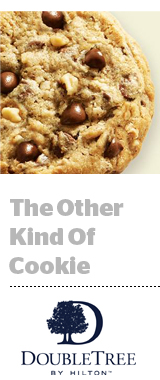 DoubleTree takes a cookie-first approach to marketing – the kind you can eat.
DoubleTree takes a cookie-first approach to marketing – the kind you can eat.
But when it comes to data collection, the Hilton-owned hotel chain, known for handing out warm chocolate chip cookies to guests as they’re checking in, is interested in deeper data than just demographics and browsing history.
“It doesn’t matter to me whether you’re a man or a woman or what your age is or your race – that doesn’t feed me the data I need to make marketing decisions,” said H. Stuart Foster, Hilton’s VP of global marketing. “When we segment users, we think about their mindset, their motivation for traveling.”
DoubleTree, which recently launched its integrated “Your Warm Cookie Awaits” campaign, draws on data from the 40 million members of its loyalty program to inform marketing strategy.
“We know how many people use the restaurant, how much they spend, what types of hotels they stay at outside of DoubleTree in the Hilton portfolio,” Foster said. “The type of activities that people engage in, that is what’s relevant to us.”
DoubleTree’s top goal is developing a direct relationship with its current and future guests, whether that’s through a display ad on a sports site or an interactive billboard.
“There are lots of different metrics we can track and targeting we can do, but it all boils down to driving greater engagement,” Foster said. “Engagement is the best measure of the health of our relationship with our customers.”
AdExchanger caught up with Foster to talk data, programmatic tips, media buying strategy and cookies, both edible and trackable.
AdExchanger: What is DoubleTree’s marketing philosophy?
H. STUART FOSTER: We’re growing at an incredible rate, with over 500 hotels around the world and 35 new hotels opening this year. As we continue to grow, we need to remain distinct and differentiated. DoubleTree, simply, is about being welcoming.
 We want to make sure that people feel welcome during their entire stay, not just upon arrival. One way we do that is through our marketing.
We want to make sure that people feel welcome during their entire stay, not just upon arrival. One way we do that is through our marketing.
An experiential campaign like “Your Warm Cookie Awaits” is about having a conversation with the consumer, as is any campaign. Our marketing mix and the channels we choose are all about engagement, from digital banners when someone is trying to book a hotel to social media, where they’re dreaming about travel and thinking about their next trip.
What about digital specifically?
Our strategy is focused on three areas of digital engagement.
The first is digital billboards, which make up about one-third of our investment and reach 22 million people in four markets: New York, Denver, Washington, DC, and LA, places with a high degree of foot traffic where tourists are enjoying the city.
People who capture a picture of a cookie dropping through a box on the billboard can submit it through social media for the chance to win free nights at a DoubleTree. We’re trying to get consumers to engage with our message and not just see it as an ad on a billboard.
The second piece is paid social, which is about 20% of our investment. With this campaign, we’re asking people to use the #sweetwelcome hashtag to capture and share moments of welcome.
The last piece, straight-up digital media, is more tactical, and makes up about 40% of our spend. We’re buying banners on websites where people research travel, but we’re also targeting them in places that are relevant to their lives: business travelers on news sites or sports fans on sports sites. Culinary sites also make a lot of sense for us.
Does DoubleTree buy media programmatically?
When we buy programmatically, and we do a lot of programmatic buys, we put up guardrails and filters related to interests – news, sports, culinary and travel, for example – and then we segment within a network buy to find people who, say, traveled in the past 12 months or who have stayed in a hotel recently that cost a minimum of X dollars. When you put filters on programmatic buys, they become more effective.
Do you have any reticence about buying programmatically? It’s been getting a black eye recently.
Going into programmatic blindly focused on impressions can waste an incredible amount of money. You’re buying what you think are eyeballs, but they might just be bots or who knows what. That’s where the black eye comes from.
Smart marketers know that data is only as good as how you use it. We use it to narrow the target and find effective targets for our message, people who are engaging with our brand. We match profiles from an interest standpoint, not a demographic standpoint, and then we look for lookalikes.
Sometimes that might limit or lower our ROI, but I’m content with that. Achieving reach doesn’t work if it’s not having an impact or causing engagement.













